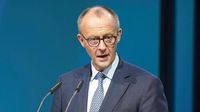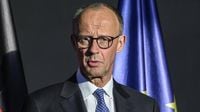In a significant diplomatic move, German Chancellor Friedrich Merz has publicly called on the U.S. government to refrain from interfering in German domestic politics. This statement comes in light of recent comments from members of the Trump administration who have expressed support for the Alternative for Germany (AfD) party, which has been classified as right-wing extremist by Germany's Federal Office for the Protection of the Constitution.
Speaking in an interview on ZDF on May 6, 2025, Merz criticized what he termed "absurd considerations of the Federal Republic of Germany" by U.S. officials. He emphasized that he has not meddled in American electoral affairs and urged the American government to respect Germany's political landscape. "I would like to encourage the American government to leave domestic politics in Germany to domestic politics and to stay out of these partisan considerations as far as possible," Merz stated.
Merz's remarks reflect growing tensions between Germany and the U.S., especially as the new Chancellor prepares for a phone call with President Donald Trump scheduled for May 8, 2025. This call is expected to address not only bilateral issues but also the broader European perspective, as Merz aims to represent the interests of Europe as a whole. He noted, "We are even larger than the United States when it comes to the number of consumers here, more than in America and Canada combined."
Despite the diplomatic overtures, Merz faces a challenging environment. The Trump administration has shown a preference for supporting the AfD over the newly formed government, a situation that could complicate Merz's efforts to establish a strong transatlantic alliance. The U.S. government’s current stance has been seen as a direct challenge to Merz's leadership, particularly as key figures in Trump's circle openly back the AfD.
U.S. Secretary of State Marco Rubio has criticized the classification of the AfD as extremist, labeling it a "veiled tyranny" in Germany. Meanwhile, Vice President JD Vance accused German bureaucrats of attempting to undermine the AfD, which he claims is the most popular party in Germany. Vance's comments echo a broader narrative supported by Trump loyalists that positions the AfD as a victim of an unfair political system.
This support from the Trump administration could pose significant challenges for Merz, who opted not to form a coalition with the AfD after the federal elections, instead choosing to ally with the Social Democratic Party (SPD). Political analysts, including Dominik Tolksdorf from the German Council on Foreign Relations, suggest that the U.S. backing of the AfD complicates Merz's ability to navigate transatlantic relations effectively. Tolksdorf remarked, "This is a huge problem for Merz and at least as serious as many other debates we are currently having about trade, NATO, and Ukraine."
As Merz prepares for his upcoming discussions with Trump, he is expected to tread carefully through what has been described as a "diplomatic minefield." The potential for the U.S. to leverage its support for the AfD as a bargaining chip in future negotiations with Germany looms large, raising concerns about the future of the transatlantic partnership.
Merz's initial foray into international diplomacy has been marked by these complexities, as he seeks to assert Germany's position while also addressing the challenges posed by the Trump administration's alignment with the AfD. The Chancellor's upcoming phone call with Trump will be closely watched, not just for its immediate implications but for how it may shape the future of German-American relations.
In his remarks, Merz has consistently emphasized the need for the U.S. to recognize the distinction between extremist parties and those in the political center, a sentiment he hopes will resonate during his discussions with Trump. The lack of a congratulatory message from Trump following Merz's election as Chancellor, unlike responses from other world leaders, has not gone unnoticed and adds to the tension between the two nations.
As the NATO summit approaches, where Merz is expected to meet Trump in person, the stakes are high for both leaders. The outcome of their discussions could set the tone for future cooperation or exacerbate existing tensions. Merz's ability to navigate this landscape will be crucial as he seeks to establish a stable and cooperative relationship with the U.S. while managing the complexities of domestic and international politics.
Overall, the situation presents a unique challenge for Chancellor Merz, who must balance the interests of Germany and Europe against the backdrop of a U.S. administration that appears to favor opposition parties within Germany. The coming weeks will be pivotal as Merz attempts to solidify his position both at home and abroad amidst these challenging dynamics.





